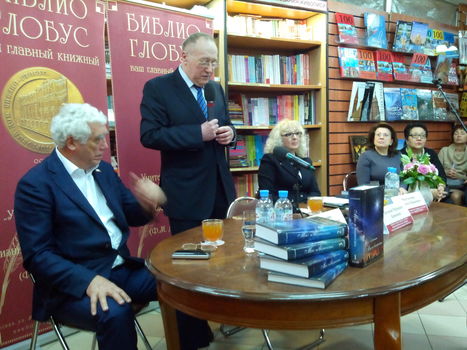The Diplomatic Academy of the Russian Ministry of Foreign Affairs held the presentation of the fifth volume of the book 'The Moment and Eternity: Story of One's Life and Observation of the Life of All Humanity' by the Rector of the Academy, Professor, Doctor of Historical Sciences, Honored Scientist of Russia Yevgeny Bazhanov. The book tells about the restructuring, initiated by Mikhail Gorbachev, the evolution of Moscow's foreign policy.
The author told us about the book in his easy and exciting manner: "At that time our industry was slipping, many goods were of poor quality, vehicles stalled on our roads, TVs exploded, razors did not shave, drugs did not help and we have a small choice of food. People travel hundreds or even thousands of kilometres to Moscow by plane or train to buy sausage sometimes blue colored, paper sausages, cheese without a name and so on. And they all chased after foreign goods. There was a massive problem with housing, with schools, everything was not enough. And, of course, in these conditions few people believed in the communist bright future that is about to come, and, even more so, in our leaders. Under these conditions, Gorbachev comes to power, who was young, full of energy, full of enthusiasm, full of ideas, he promises to fix everything and develop our country; and looked like the country had come to life. Gorbachev was swamped with offers. Some suggested to rule the country with an iron hand in a stalinish way, others said that market mechanisms should be introduced, others added that there won't be enough market mechanisms, and political democratization should be carried out in the country, then there will be reforms.
My wife and I were working in our embassy in Beijing. The ambassador calls me and says: "Gorbachev is recruiting a new team for the Central Committee apparatus, there is an offer to transfer you to the international department of the Central Committee." I say: "Can I refuse?" He looked at me sternly and said harshly: "The Central Committee of the Communist Party of the Soviet Union is not a meat shop, one do not refuse when invited there". When I arrived in Moscow, I immediately realized my mistake, because everyone who worked there, felt themselves living on Olympus. Since January 1987, Mikhail Sergeyevich has proclaimed a policy of publicity and democratization, stressing that it is not an end in itself, but a means of promoting "perestroika".

Our main job was to prepare notes and decisions on the basis of these notes, which were the source of Soviet law. If there is a decision, then any question can be solved. For example, when a delegation from Cuba arrives, the decision says who meets it, who sees it off, who gives it gifts, who takes it to a restaurant, and everyone, every department and every ministry, knows what to do. If there is no such decision, it is difficult to solve the problem. At some point one employee who was supposed to go to the US, but the Americans did not give him a visa, said: "There is a decision of the Central Committee of the Communist Party of the Soviet Union, but they did not give me a visa. What is this mess?"
We needed to keep a distance with the outside world. When i started working there, my boss called me and said: "When you go to another organization, whether it's the Ministry of Foreign Affairs, or the Ministry of Defense, do not argue or debate with them, sit there with an air of importance. Let them argue, talk, discuss, and you sum it up, if you want.
Another rule was deference to rank. I did not understand it at first, tried to act smart at meetings. At the end of the meeting my boss said: "Everyone can go now except you". I stay and he tells me: "My job in the Central Committee of the Communist Party of the Soviet Union is thinking and yours is giving me information. I call you at 3 am, wakes you up and ask how many pigs there are in Sichuan province. If you know it, you report and go to sleep. And if you do not know, you have nothing to do in the Central Committee of the Communist Party of the Soviet Union".
After Gorbachev came to power, changes started. At first, the apparatus liked his actions. He talked about acceleration, about the need to buy equipment abroad and produce goods by oneself instead of buying them. He introduced state inspection at enterprises. He started struggling against drinking, it was impossible to work because of widespread consumption of alcoholic beverages. There have been changes in international affairs as well. When we had a meeting, a colleague stands up and says: "What a fine fellow Mikhail Sergeevich! He began to smile at our Western enemies, but in fact we beat them in the face. That's the way it is - smile and hit in the face". But as time went on, the situation began to change, it began to cause questions among the staff of the apparatus. There were reductions, they started to fire old people. Then they started talking about some kind of market, then about some kind of self-financing, then they started to take power away from the apparatus and transfer it to state structures, which also caused misunderstanding. In international affairs, Mikhail Sergeyevich started to apologize to everyone, started to make concessions. People began to wonder whether we were going the right way, and the resistance of his line began. I saw it in general, but especially in the Chinese direction, which I was engaged in.
It became clear that the ongoing changes could end in the collapse of the Soviet Union. My wife and I predicted it already in May 1987 - we have a multiethnic country, consisting of ethnic republics, so all complaints and negative historical moments, our economical and social problems had to become evident.

Speaking about Bazhanov's book, the head of the Center for Euro-Atlantic Studies of International Security of the Institute of Contemporary International Studies at the Diplomatic Academy Tatyana Zvereva said: "The book is dedicated to the late wife of Evgeny Petrovich - Natalia Evgenievna. These are touching memories of the beautiful years they lived together, of the great and glorious life path. A reader gets acquainted with diary entries, letters and notes on various topics. The book is imbued with subtle lyricism and filled with bright and pure feelings of its heroes. "
The general director of the publishing and trading corporation 'Dashkov and Co' called the book epic: "Five volumes have already been published and five more volumes will be published. The essence and content of this book very successfully reflects the title of the book 'The Moment and Eternity" and the subtitle 'Story of One's Life and Observation of the Life of All Humanity'. The author succeeded to reveal and show the whole era with the example of one family. But the uniqueness of the book lies in the fact that it is based on letters and diaries".






